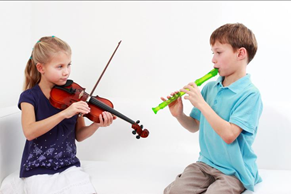LEARNING AN INSTRUMENT TEACHES LIFE SKILLS:
Beginners, often your first month learning an instrument is great! By the second month, we are still on our path, and by the third month we realize “Boy, this is really challenging!” For most beginning music students, learning to follow instructions is a big task and a big part of the lesson. Practice becomes another event to add as a part of their daily routine, so this means a lot of reminding and patience from parents at home. The optimal situation is a triangle that incorporates teacher-parent-child as a unit to accomplish a common goal.

Learning to use positive reinforcement about practicing takes time, because it’s easier to say “why aren't you practicing" or "that's not right," then, "let's really enjoy some practice time" and "what an improvement for that part." When you feel like your student is in a slump, it is important to remember to take things in small steps. If all you get from a session is one minute of focused practice, then that is a good session! Dr. Suzuki’s statement of “Two minutes of practice with love” simply means that your practice should go as long as you can with enjoyment. A parent’s task is therefore to notice when the child is tired and irritable and identify a good time to end the practice.
Please don't be discouraged if children don't want to practice, as it's common to quickly assume that an instrument wasn't the right thing to do. Dr. Suzuki says, your child isn't reacting to the instrument or the study of music, your child is reacting to the discipline of obeying and following the instructions of a teacher and/or parent. Learning to play a musical instrument is just another medium for accomplishing these life
